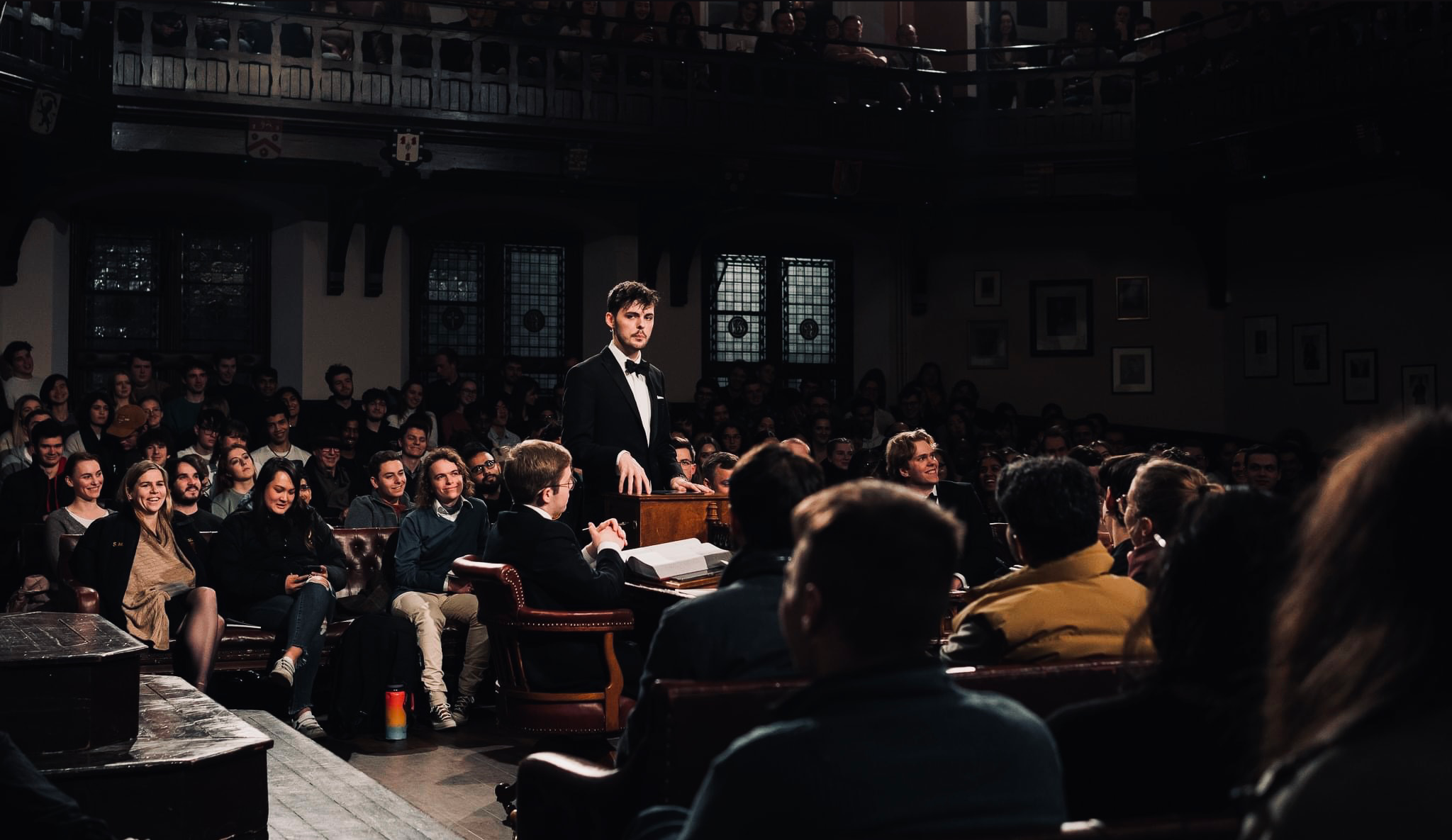I stand in the reception of a grammar school in Buckinghamshire with a Cambridge University professor and a journalist from The Guardian, ready for a debate on the question ‘Does Free Will Exist?’ It is a hot, July day, and 500 students and staff are keenly awaiting a stimulating discussion on one of the perennial philosophical questions. Usually, the students (and perhaps also the staff) would be waiting for school to finish and the holidays to begin, but there is a huge buzz as we await the professor’s sparring partner for this philosophical debate.
Finally, a taxi drops off a young man in his early twenties who attempts to make his way to join us through an army of admiring sixth-form boys, each trying to shake his hand and take a selfie. I have put on a lot of debates in schools, but this is a first. The Cambridge professor smiles in amusement, and the deputy headteacher seems almost embarrassed that no one is shaking his hand or knows who he is. But every boy and girl in this school seems to recognize Alex O’Connor.
We hand both men and our moderator a bottle of water and explain the timings. I glance to my left as the students are filing in. They are doing so with urgency. No one wants to waste a second. A girl on the second row bashfully fans her face before remarking to her friend, ‘He’s so smart and sophisticated.’ Girl-crushes are commonplace as I look around. Alex is a little unwell and slightly flustered, but as soon as the camera rolls and the dialogue begins, he becomes a highly articulate, supremely confident, and razor-sharp interlocutor, well able to converse with a professor twice his age and in possession of ten times his education. When we come to questions, everyone wants to address Alex, on topics both related and unrelated to the debate question.
He is a new superstar of atheism—the new superstar, in fact, though he is not alone.
Alex O’Connor, the ‘Cosmic Skeptic’
When I finally get a moment to introduce myself as the person who has organized the debate, Alex is apologetic for his illness and polite as expected. He comes across as humble and self-deprecating. He candidly remarks on his surprise at the excitement for this sort of event in a school environment. I tell him that he is now the face of unbelief for Generation Z; young sceptics are no longer looking to Richard Dawkins, but to him. Therefore, his voice in this venue is important and timely. He looks at me with surprise and I can tell my words are sinking in. It is not something he has thought about, but it is 100% true.
Alex has over 900,000 subscribers on his ‘Cosmic Skeptic’ YouTube channel and a massive following on other social media platforms. He has held the number one position in podcasts about religion and spirituality. In an era of super-guides such as Jordan Peterson and Sam Harris, Alex is a young, fresh face stepping into the limelight. He achieved this through a decade of hard work building a platform as a teenage atheist whose videos resonated with those growing up alongside him.
Everywhere he goes, an audience made up predominantly of young men is eager to introduce themselves, take photos, and ask questions. He has never written a book or published academic material and he only recently received his degree (in philosophy and theology from Oxford University), yet he is a superstar. He possesses phenomenal communication skills and can seemingly recall everything he has ever read in an instant, and his breadth of reading seems vast.
He is not the brash, arrogant man of New Atheism past. He seems as surprised as anyone at the place he has been given and works as if to prove that he belongs. Yet everyone is queueing up for a place on his show Within Reason or to share a platform with him. Sam Harris and Richard Dawkins themselves—the two surviving ‘horsemen’ of the New Atheism—have been guests on his show. Slavoj Žižek, Carlo Rovelli, David Deutsch (we need to get some women on this show!), Ben Shapiro, Jordan Peterson, and an impressive host of academic and popular guests flock to his show to be interviewed by him or invite him on to their shows. Even when things go wrong, they go right—Peter Hitchens storming out mid-interview and venting on X only further boosted Alex’s reputation.

People relate to Alex as normal, like them, and yet see him as a voice of authority despite his young age and limited education. He seems a hard-working, self-made man, a prodigy with powers to amaze. He is at home at the Oxford Union and on BBC News, because he appears to be the voice of a misunderstood and questioning generation.
We sit in a steakhouse after the free will debate, and Alex’s food seems to go cold as he is eager to converse and dialogue with everyone at the table. Another reason for his ability to reach Generation Z then strikes me: he is authentic. He is the same person all the time: someone interested in the world of ideas and open to changing his mind. Alex took criticism for abandoning veganism when he had been a public advocate for it, yet this only gained him more respect among the crowds.
Intellectual humility is in short supply, so when this most cynical generation sees someone willing to make decisions based on data and be honest about it, there is a respect given to them that is hard for others to earn. O’Connor has earned the trust of the next generation, and they eagerly look to what he has to say as a guide for them. As one student said to me, ‘He asks the questions I haven’t thought of.’
Stephen ‘Rationality Rules’ Woodford
Two days later, I am hosting the second largest atheist on social media: Stephen ‘Rationality Rules’ Woodford. We are also in a grammar school, and again the dialogue is with a Cambridge PhD. With a strong sense of déjà vu, I note that everyone knows who one of my guests is, and it is not the academic.
Stephen greets me with a warm smile and a generous hug, as does his media manager. This is the third time he has spoken in schools for me. With half a million YouTube subscribers and a strong presence on other platforms, Stephen has made huge waves.
Stephen is very on-brand. His distinctive look, which has been quite Viking-esque in recent years, goes with his catchphrases (‘Hello, my fellow apes’) and his very own card game, Debunked (in which the aim is to debunk arguments by showing up the fallacies they contain). When one talks to him, he is Stephen, but in front of the camera or a live audience, he is very much Rationality Rules.
He has marketed himself extremely well to a global audience that is predominantly young, but his ‘brand’ sees all demographics well-represented. When Stephen speaks and formulates his attacks on religion, it is reminiscent of his idol, the late Christopher Hitchens. Stephen’s convictions are the same as Hitchens’s and he has little patience for folly. Religion must go because it is irrational, anti-scientific, and a relic of ancient nonsense. He carries the Hitchens banner with purpose and pride. Indeed, one of the star cards in Debunked is the ‘Hitchslap’. (Though it should be said that neither Alex nor Stephen are mere followers of the old New Atheists; Stephen is very open about his profound disagreements with Dawkins over issues of gender and sex while Alex has devoted a whole video to critiquing some of Hitchens’s religious arguments.)

Stephen is tremendously warm with everyone I have put him in dialogue with. However, that is no guarantee of how the argument will unfold. He is courteous over lunch and genuinely interested in his opponent. He gives respect to those who have mastered their field and endured the grind of academia. In particular, he gives respect to scientists. They are the gatekeepers of truth in the New Atheist tradition that Stephen is continuing. But when the camera is rolling and the audience is listening, he does not hold back on the hard questions and will speak his mind without apology. Offence will be given if it means getting to a straight answer—or such is the idea.
Normally after these sorts of school debates, it is the religious guest that faces the most questions. With Alex and Stephen, the reverse happens. For Alex, it is because of his immense popularity. Stephen has managed something else: due to his polemical style, he is descended upon by large numbers of religious students eager to press him on his points and defend their position. He succeeds in pressing the buttons of those who may never have heard their beliefs questioned in person as he has. Stephen is not afraid of engaging with these opponents, but he returns to the respectful character that marks him off-stage. He is respectful of the person but won’t suffer foolish ideas.
The future of New Atheism?
Much internet atheism since 2001 has been cringy, crass mudslinging aimed at the lowest-hanging fruit. Alex O’Connor and Rationality Rules strike different tones, but in their own individual ways have sought to raise the conversation to something more sophisticated, despite having started with more mockery and mimicking their New Atheist heroes.
In these two friends, #1 and #2 in the UK for social media atheism, we find the new faces of unbelief for the next generation. To me, one of them marks a young voice of disbelief entering the high-dialogue sphere as a questioner who articulately represents the fears and questions of Generation Z. The other represents the ideas that shaped the past era and carries them alive into the new world with a fierce conviction that the mission must not die, for the future is too precious to waste on fundamentalism. They complement each other well and rose together into internet superstardom. Now they are both international speakers, debaters, and frequent radio guests.
Now that they (among others) have replaced Dawkins as the face of unbelief in Britain, what will come in the next decade as they grow up? Certainly, they will bring their crowd with them, but how will they evolve? It will be interesting to see, as New Atheism moves further into the rear-view mirror, whether the conversation moves with them or whether it replaces them.
An interview by Samuel McKee of Stephen Woodford can be read here.
Related reading
How three media revolutions transformed the history of atheism, by Nathan Alexander
The need for a new Enlightenment, by Christopher Hitchens









Your email address will not be published. Comments are subject to our Community Guidelines. Required fields are marked *
Donate